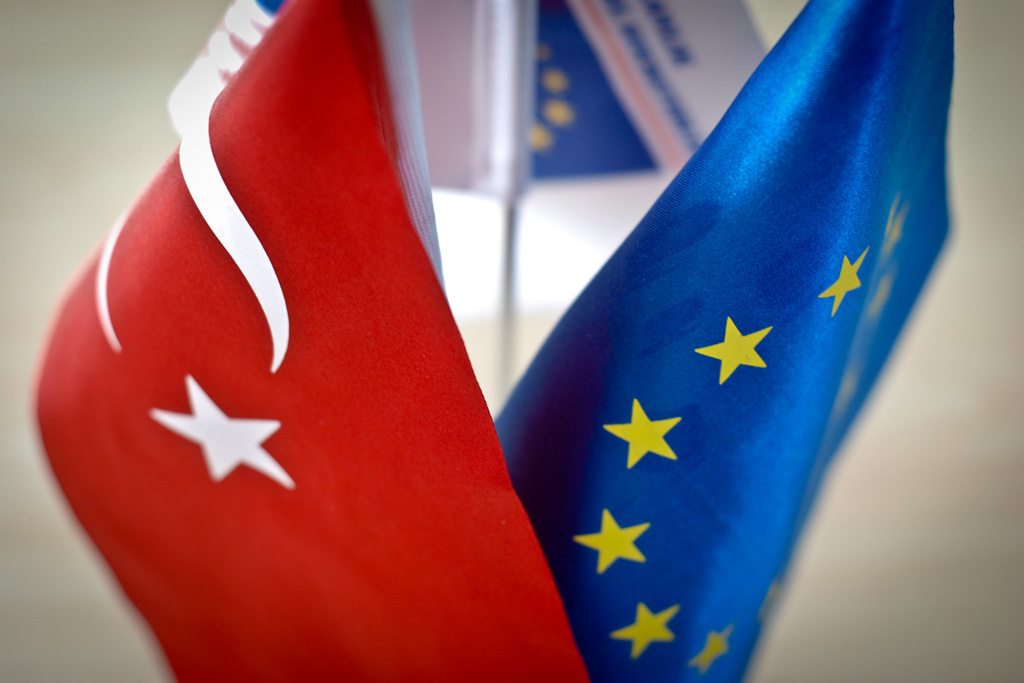
One week before the European Council meeting, Turkey watchers witnessed a member of the Turkish Parliament from the Peoples’ Democratic Party (HDP) and a human rights defender, Ömer Faruk Gergerlioğlu, got controversially convicted for a social media post. Then, country’s top prosecutor filed a case with the constitutional court demanding the closure of HDP, Turkey’s third largest party. Following that, with a late-night decree Turkish President Recep Tayyip Erdoğan decided to withdraw Turkey from Council of Europe’s Istanbul Convention, which aims preventing and combating violence against women and domestic violence. The same night, the governor of the Central Bank was sacked just after four months in office while he was being praised internationally for returning to mainstream monetary policies. All these developments put European leaders in a difficult position right before the European Council meeting. The dilemma between promoting values and focusing on interests –an historical division in external relations– was once again present. The differences between EU institutions and member states complicated the picture even more. Before exploring these complexities, however, it is important to ask two questions.
The question on many people’s minds is why. Going through a pandemic and economic hardship in a very polarized society, why Turkish government is taking all these steps at once?
While trying to understand what is going on in Turkey one should keep three elements in mind: the government’s overwhelming desire to stay in charge; the power struggles within the state apparatus; and the lack of institutional structures that serve as checks and balances mechanisms. On top of that, Justice and Development Party’s “new vision for Turkey” for 2023, Turkey’s next presidential election and 100th Anniversary of the Republic, is even more nationalist, religious in the public domain, and more independent when it comes to foreign policy in comparison to historical Western orientation of the country in the past.
The next question is why are we witnessing all these developments now? During all the charm offensive that even includes the announcement of a Human Rights Reform in line with a renewed effort to get along with the Western allies?
Today, while the state of domestic affairs is at a historical low for many segments of the Turkish society, the country’s leadership keeps on with its charm offensive with Europe. The tensions in the Eastern Mediterranean over the drilling rights and exclusive economic zone definitions are significantly decreased. Greece and Turkey resumed exploratory talks. Dialogue on Cyprus is expected to start before the summer. Celebrating the Fifth Anniversary of Turkey-EU Statement on Refugees, the discussions on what should be done for supporting Turkey’s efforts with 4 million Syrians in Turkey continue. The newspapers are full of reconciliation efforts coming from Turkey not only with the EU and the United States under the Biden Administration but also with Egypt or Israel.
This puts a complicated picture in front of European leaders. A dilemma between criticising the recent steps taken by Turkey on its domestic arena or just focusing on concessions on foreign policy. Surely, the division between defending core values of the Union versus putting interests in the centre is nothing new. And there are reasons to justify the latter for the Union. The interdependency between Turkey and the EU is undeniable. The migration cooperation is a delicate issue for the future of Europe. European economies are exposed to the Turkish one. Energy, fight against terrorism and security cooperation through NATO are other important items on the table.
Having said all that, Turkey still is an official candidate for accession. Even if the negotiations are frozen, the deteriorating state of democracy, rule of law, basic rights and freedoms are too grave to ignore. Turkey, as a member of Council of Europe, is not even complying with the decisions of European Court of Human Rights. Furthermore, there is pressure not only from the European Parliament, but also from some member states, mainly the Nordic countries and the Netherlands, to treat Turkey as a candidate country and hold it accountable for its moves.
Against this background, EU leaders have agreed on a dual approach, as suggested by the Joint Communication to the European Council, prepared by the European Commission and HR/VP Josep Borrell. According to this report, which is generally welcomed by the leaders, there will be a “phased, proportionate and reversible approach”. There will be advancements in various aspects (including economic cooperation, even Customs Union modernization, high level dialogue or people-to-people contact) if things go well between Turkey and the EU, mainly in the Eastern Mediterranean. On the contrary, if Turkey goes back to “renewed provocations or unilateral actions in breach of international law”, the European Union will use instruments and options at its disposal (including restrictions on EU-Turkey economic cooperation). Turkey will be back on the European Council’s agenda in June 2021, while both the European Commission and the Council were asked to work on different dossiers. One of the most urgent issues on the table is irregular migration management. The Commission is soon expected to present a proposal to the Council for the continuation of financing for Syrian refugees in Turkey.
The European Council conclusions show once again that Turkey is rather treated like a third country in the neighbourhood than a candidate country for accession. This has been the trend since 2016 when Turkey-EU Statement on refugees was signed. Taking into account the current state of domestic affairs in Turkey, it may be understandable for many. However, it still is in the Union’s interest to have a rules-based relationship with Turkey. In the end, analysts may struggle to predict where all this will end, however, it is better promoting core values of the Union in the neighbourhood for the long term than settling down for a fragile status-quo. An unstable Turkey in domestic arena will be a source of instability for the Union as well. The need to redefine the relationship framework is on the table, however, till then a rules-based approach should be followed.


